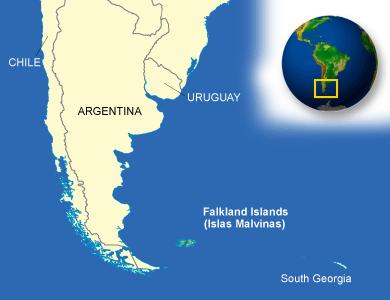3000 people on a remote island 500km away from the nearest continent are not exactly a recipe for dynamism and innovation. And yet, change is in the air in the Falkland Islands/ Islas Malvinas, an archipelago that is likely to see its economy transformed by the discovery and exploration of the medium-sized Sea Lion oil field just north of the islands. The economic boom is likely to increase tensions further between Britain, the Islanders and the Argentine government, which has recently created a new “Malvinas Secretariat” (“Falkland Islands will be ours, says Argentina’s new minister“).
Yet the Islanders remain bullish about their future. In a packed room in the Chamber of Commerce in Stanley, the capital, business representatives tell our academic delegation from Brazil that they expect the Islands’ GDP to grow seven-fold over the next decade. Already with the highest GDP per capita in the region, this would turn the Islands (financially self-sufficient except regarding defense, which is paid for by London) into one of the richest places on earth.
At the same time, they bitterly complain about Argentina’s campaign to economically isolate the Islands from Latin America. When Nestor Kirchner became President, Argentina prohibited charter flights to the Islands (which have to cross Argentine airspace to get there from Chile), leaving the population only with one weekly flight to Punta Arenas in Chile (in addition, a military aircraft regularly flies to London via Ascension Island and can take a limited number of civilians). They say both Brazilian and Uruguayan businesses are often reluctant to engage with the Islanders because of the political sensitivities. A local businessman tells me how, at customs in Rio de Janeiro, a Brazilian official explained that he could not complete the paperwork because “this would upset Argentina”. Another asks, “If our 3000 people can stand up to this regional bully (Argentina), why can’t you (Brazil), with your 200 million inhabitants?” A local oil executive laments that hopes for cooperation with Petrobras were dashed when Argentina passed a law that firms drilling off the islands’ coasts would be ineligible to exploit shale-oil and gas in Patagonia.
Yet, as one would expect, the economic sanctions have also united the islanders. “This policy has taught a whole generation never to trust Argentina”, a local legislator says.
During a meeting the South Atlantic Environmental Research Institute (SAERI) in Stanley, a scientist says Argentina’s refusal to cooperate with local fishing authorities has complicated efforts to preserve local fish stocks. “Twenty years ago, we used to just pick up the phone to coordinate our strategies with Argentina – today that is no longer possible.” He says the Islanders would like to return to the 1990s, when Argentina’s government sought to engage the local population.
The 1982 war remains the defining historical moment for the Islanders. Paradoxically, it turned around the population’s economic fortunes. While the 1960s and 1970s were marked by demographic decline and a lack of opportunities, the aftermath of the war saw a fundamental land reform that turned those working on the farms into land owners. The fishing business took off, leading to unprecedented economic growth. Infrastructure improved dramatically. There is now a government-subsidized air taxi service that allows locals (and tourists) to quickly move between the islands. A growing number of cruise ships came to the islands. There are over 30,000 visitors per year who spend a day around Stanley to visit the penguin colonies. The government pays secondary and university education abroad for every Islander. 60% of graduates decide to return to the islands, a figure far higher than that of other British Overseas Territories.
The coming oil boom presents opportunities but also dilemmas. Hundreds, if not thousands of workers will be necessary for exploration and the build-up of the industry that supports it, which is certain to impact local society. The majority of Islanders are of British descent (many now in the 6th, 7th and 8th generation), but the number of immigrants is already growing (they can apply for citizenship after 7 years). Around 10% of the population is Chilean. The head of the economic policy unit hails from Finland, the representative of the agricultural department from Australia. A Zimbabwean, initially hired to help in the removal of Argentine landmines which still cover parts of the islands, brought his family and settled in Stanley. There are now people of 60 different nationalities living on the islands. And yet, the changes coming are far greater and likely to confront the local population with important questions about how to preserve their cultural identity.
Read also:
Oil in the Malvinas/Falklands: Brazil’s next regional headache?
Is Brazil abandoning its global ambitions?
Photo credit: countryreports.org









